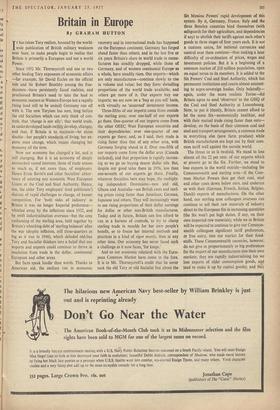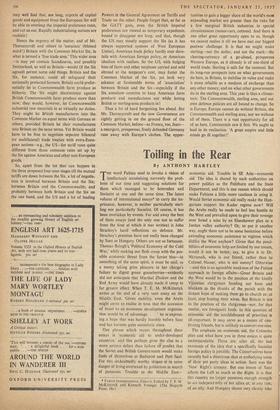Britain in Europe
By GRAHAM HUTTON T has taken Tory realism, boosted by the world- wide publication of British military weakness over Suez, to make people begin to realise that Britain is primarily a European and not a world Power.
Since 1952 Mr. Thorneycroft and one or two other leading Tory exponents of economic affairs —for example, Sir David Eccles on the official side and Sir Robert Boothby among the free- shooters—have persistently faced realities, and proclaimed Britain's need to take the lead in economic matters in Western Europe lest a rapidly rising (and still to be united) Germany run off with it. The new Toryism has seen, long before the old Socialism which can only think of con- trols, that 'change is our ally'; that world trade, as underdeveloped lands swiftly develop, changes; and that, if Britain is to maintain—let alone double—her peoples standards of living, her ex- ports must change, which means changing her economy all the time.
Now our economy has changed a lot, and is still changing. But it is an economy of deeply entrenched vested interests, those of trade unions as much as, if not more than, of employers. Hence Ernie Bevin's and other Socialists' abhor- rence of entering any economic West European Union or the Coal and Steel Authority. Hence. too, the older Tory employers' (and politicians') distrust of rapid challenges to change, of keener competition. For 'both sides of industry' in Britain it was no longer Imperial preference— whittled away by the inflations since 1932, and by swift industrialisation overseas—but the cosy cushioning of the sterling area, held together by Britain's whacking debt of 'sterling balances' after the war (despite inflation, still three-quarters as big as it was in 1946), which deluded old-line Tory and Socialist thinkers into a belief that our imports and exports could continue to thrive in insulation from trade in the dollar, continental European and other areas.
But facts speak louder than words. Thanks to American aid, the swiftest rise in economic recovery and in international trade has happened on the European continent; Germany has forged ahead faster than others; and in the last five or six years Britain's share in world trade in manu- factures has steadily dropped, while those of Germany, and of western continental Europe as a whole, have steadily risen. Our exports—which are only manufactures—continue slowly to rise in volume and value; but they form dwindling proportions of the world trade available; and others get more of it. Our exports buy our imports; we are now on a `buy as you sell' basis, with virtually no 'unearned' investment income.
Three-fifths of our imports come from outside the sterling area; over one-half of our exports go there. One-quarter of our imports come from the other OEEC West European countries and their dependencies; over one-quarter of our exports go there; and, as I said, their trade is rising faster than that of any other area, with Germany forging ahead in it. Over one-fifth of our imports come from the dollar area (Canada included), and that proportion is rapidly increas- ing as we go on buying dearer dollar oils. But, despite our good sales there in 1956, less than one-seventh of our exports go there. Finally, whatever Socialists here may hope, the multiply- ing independent Dominions—new and old, Ghana and Australia—see British costs and sterl- ing prices rising faster than American, German, Japanese and others. They will increasingly want to use rising proportions of their dollar earnings for dollar or other non-British manufactures. Today and in future, Britain can less afford to run in a harness of controls, to try to clamp sterling trade in moulds for her own people's benefit, or to freeze her internal methods and practices in a kind of rigor mortis, than at any other time. Our economy has never faced such a challenge as it now faces, 'for keeps.'
And so our economic relation§ with the Euro- pean Common Market have come to the fore. It is to Mr. Thorneycroft's credit that he never took the old Tory or old Socialist line about the Six Messina Powers' rapid development of this system. By it, Germany, France, Italy and the three Benelux countries bind themselves (with safeguards for their agriculture, and dependencies if any) to abolish their tariffs against each other's goods in three stages of four years each. It is not a customs union, for national currencies and control over them continue—thus making a later difficulty of co-ordination of prices, wages and investment policies. But it is a beginning of a common market of 210 million population, open on equal terms to its members. It is added to the Six Powers' Coal and Steel Authority, which has permanent institutions and courts almost amount- ing to supra-sovereign bodies. Only belatedly— again, under the more realistic Tories—did Britain agree to send 'observers' to the GHQ of the Coal and Steel Authority at Luxembourg. Now, to put it bluntly, Britain cannot afford to let the same Six—economically healthier, and with their mutual trade rising faster than ours— develop, on the basis of their common coal and steel and transport arrangements, a common trade in everything else (save farm produce) while British manufactures are kept out by their com- mon tariff wall against the outside world.
The threat to us is twofold. We stand to lose almost all the 22 per cent. of our exports which at present go to the Six. Further, we stand to lose exports in the world outside—including the Commonwealth and sterling area—if the Com- mon Market Powers thus get their coal, steel and other costs down below ours, and undercut us with their (German, French, Italian, Belgian, Dutch) exports of manufactures. On the other hand, our sterling area colleagues overseas can continue to sell their raw materials of industry direct to the European Six in increasing quantities (the Six won't put high duties, if any, on their own imported raw materials); while we in Britain will be expected to continue to give our Common- wealth colleagues significant tariff preferences, or free entry, into our market for their food- stuffs. These Commonwealth countries, however, do not give us proportionately as big preferences for the import of our manufactures into their own markets; they are rapidly industrialising (so we lose exports of older consumption goods, and tend to make it up by capital goods); and they may well find that, ere long, exports of capital goods and equipment from the European Six will be able to overleap the imperial preference rates, and cut us out. Rapidly industrialising nations are realistic!
Hence the urgency of the matter, and of Mr. Thorneycroft and others to 'associate' (blessed word!) Britain with the Common Market Six, in what is termed a 'free trade area.' This wider area —it may yet contain Scandinavia, and possibly Switzerland, as well as Britain—would (if the Six agreed) permit some odd things. Britain and the Six, for instance, could all safeguard their nationally protected farmers. Britain could prefer- entially let in Commonwealth farm produce as hitherto. The Six might discriminate against British Commonwealth farm produce more than now; they would, however, let Commonwealth industrial raw materials in at virtually no duties. They might let British manufactures into the Common Market on equal terms with German or others, provided Britain let their manufactures into Britain on the same terms. Yet Britain would have to be free to negotiate separate bilateral (or multilateral) trade treaties with extra-Euro- pean nations—e.g., the US—for tariff rates quite different from those common rates set up by the Six against American and other non-European goods.
So, apart from the lot that can happen in the three proposed four-year stages till the mutual tariffs are down between the Six, a lot of negotia- tion is involved between Britain and the Six; between Britain and the Commonwealth; and probably between both Britain and the Six on the one hand, and the US and a lot of leading Powers in the General Agreement on Tariffs and Trade on the other. People forget that, as far as the GATT goes, even the British imperial preferences are viewed as temporary expedients, bound to disappear ere long; and that, though the US may stoutly support the Six (as it has always supported systems of West European Union), American trade Oolicy hardly ever dove- tails with American foreign policy, or American idealism with realism. So the US, with bulging bins of farm and other surpluses carried and sold abroad at the taxpayer's cost, may foster the Common Market of the Six, yet look very askance at favourable terms of 'association' between Britain and the Six—especially if the Six somehow contrive to keep American farm products and manufactures out while letting British or sterling-area products in !
Thus a lot of hard bargaining lies ahead. But Mr. Thorneycroft and the new Government are rightly getting in on the ground floor of the Common Market, before—as France, too, fears— a resurgent, prosperous, freely defended Germany runs away with Europe's clothes. The oppor- tunities to gain a bigger share of the world's most expanding market are greater than the risks for a few marginal British industries in special circumstances (motor-cars, cottons). And there is one other great opportunity open to us, though we cannot realise it till we have met our biggest postwar challenge. It is that we might make sterling—not the dollar, and not the mark—the clearing-currency of a go-ahead, prosperous Western Europe, as it already is of one-third of world trade. Sterling is safe for the moment. But its long-run prospects turn on what governments do here, in Britain, to stabilise its value and make it more reliable as a medium of exchange than any other money; and on what other governments do in the sterling area. This year is thus a climac- teric. The Commonwealth, sterling area, and our own defence policies are all bound to change. So is Europe. Europe cannot do without Britain, the Commonwealth and sterling area; nor we without all of them. There is a vast opportunity for all of us here. Continentals saw it first. We ought to lead in its realisation. 'A great empire and little minds go ill together!'



































 Previous page
Previous page